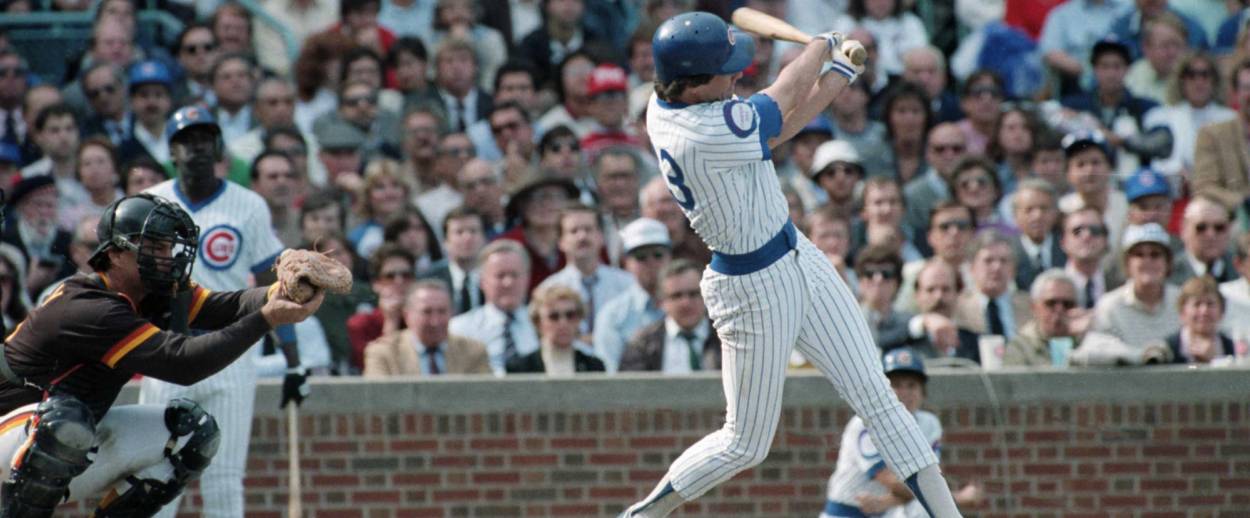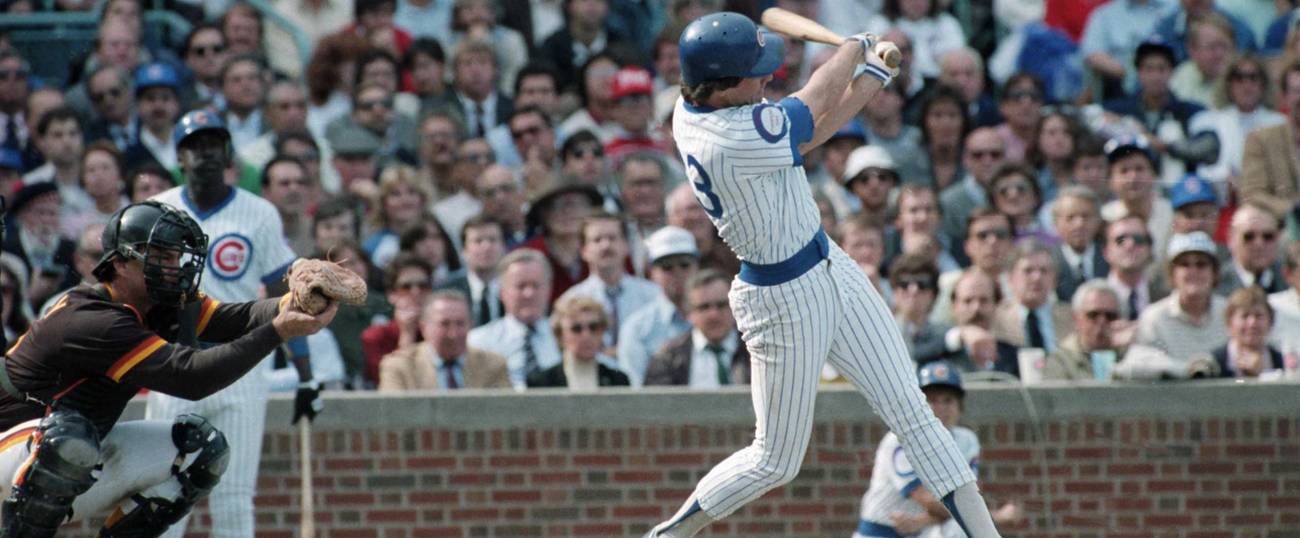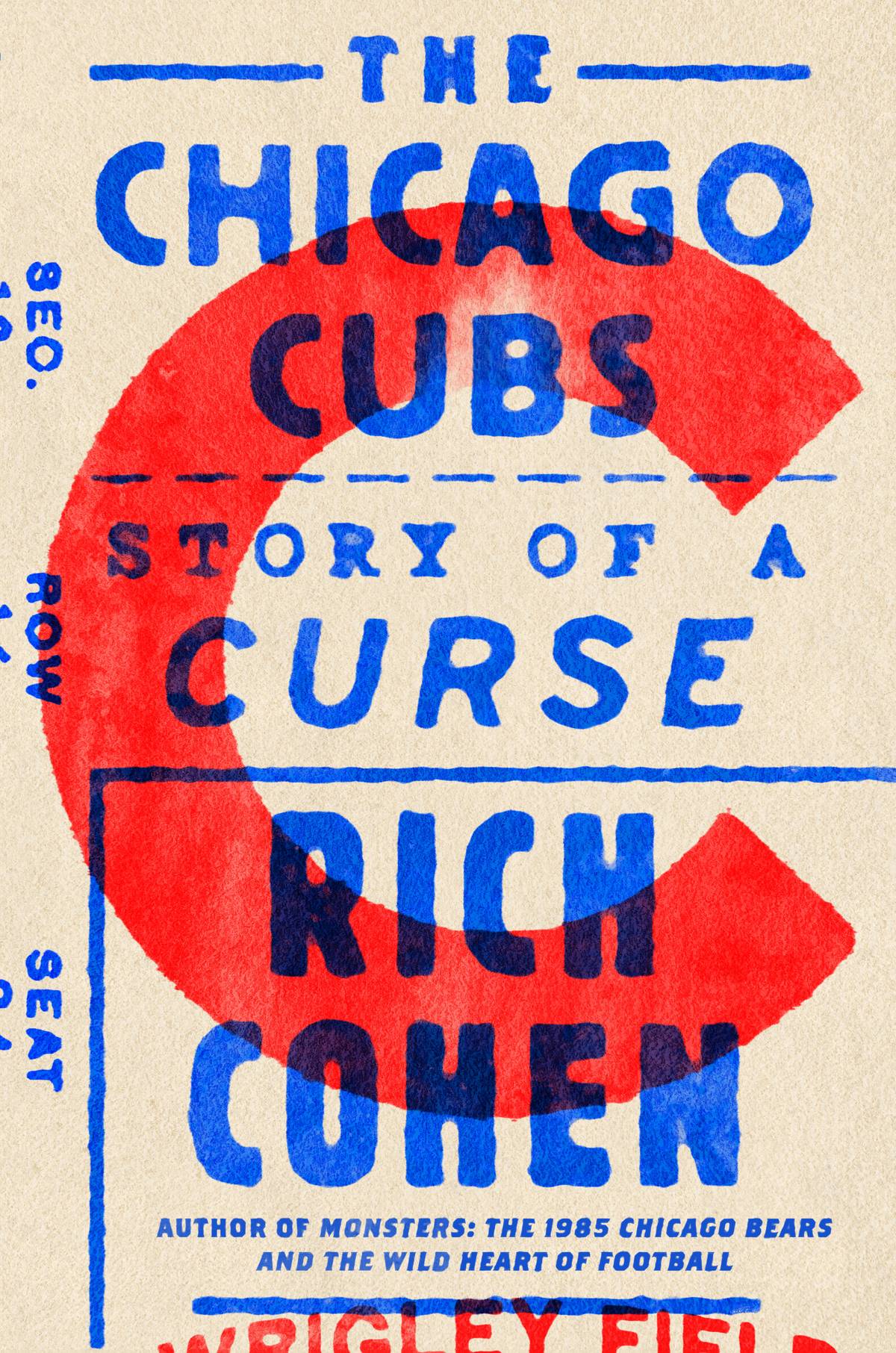How I Became a Man
As the Cubs clinch a playoff berth to defend their first title in more than 100 years, a baseball fan remembers the metaphysical horror of watching the North Side Chicago club lose in 1984




The Cubs won the NL East by six-and-a-half games in 1984. They were cruising at the finish. The only possible warning sign was the song “Men in Blue,” released that summer, on which Rick Sutcliffe, Jody Davis, Keith Moreland, Gary Woods, and Leon Durham sang, “As sure as there’s ivy on the center field wall/the men in blue are gonna win it all.” It was vainglorious and seemed to repeat the error of 1969—Stupid! Stupid! Stupid!—but who could beat us? In the National League Championship Series, we’d play the San Diego Padres, a mediocre team—one great player (Tony Gwynn) surrounded by former greats (Steve Garvey, Graig Nettles, Goose Gossage).
I went into the series with my own backstory: My sister was then at the University of San Diego Law School and dating a fellow student named Gerry Schmelter, a local kid, a surfer, and a Padres fanatic. He and his friends were always talking about the Padres: Kevin McReynolds, Tony Gwynn, Garry Templeton. I needed the Cubs to beat them down and shut him up. In my mind, as he talked, I said, “Soon you’ll be talking out the other side of your face.”
I got two tickets to Game 1. Missing school was acceptable to my teachers. I didn’t even need a note; a stub was sufficient. The game started midafternoon. We got there early. The sky was filled with fair-weather cumulus, warm with a suggestion of autumn, a stiff lake wind. In dreams, the wind at Wrigley Field is always blowing out.
The Padres had Eric Show on the mound. I’d feel differently about him later—because he was tortured—but I despised him in 1984. He was said to be a racist, a member of the John Birch Society. He won 15 games that year but was no match for the Cubs. Bob Dernier led off with a home run, then Gary Matthews homered. Rick Sutcliffe homered in the third, a monster shot by the pitcher using Ryne Sandberg’s bat. Matthews homered again later, then Ron Cey hit one. It was a phantasmagoria of extra bases. Show had been driven from the game after four innings, his pitching line just as ugly as the Birch Society. Four innings, five hits, five runs, ERA 11.23. I screamed through it all. It was a release, the filling of a biological need. I’d been nervous my entire life but realized it only now. I put my arm around everyone and said, “Did you see that!” I did not drink but was drunk. Sutcliffe gave up two hits in seven innings and struck out eight. We talked over every play on the train home, the Red Line bursting with fans. At school the next day, I was greeted as a hero, as if I myself had done something, which I felt I had.
I experienced Game 2 secondhand—on the televisions set up everywhere in school, rolled into place by the AV team. It was not quite the drubbing of Game 1, but it was good enough. Cey doubled, Sandberg doubled, Steve Trout pitched eight and a third, and we won.
The NLCS moved to San Diego, where the Cubs had to win only one out of three games to advance to the World Series. To me, it seemed like a simple mop-up operation. I explained this to my sister’s boyfriend. I gloated. In other words, I stood exactly where so many Cubs fans had stood before me: on the precipice of what seemed certain victory, waiting to party. There was a sad, amused look in the faces of old fans I spoke to during the travel day. They could have warned me but chose not to. Why tell the condemned that the governor has not called and the reprieve will not come? Let the boy enjoy his last meal—he’ll learn soon enough.
The Cubs were blown out in Game 3—so bad we forgot about it the moment it was over. We watched Game 4 in the living room on a TV with the sound turned down so we could listen to Harry Caray’s WGN radio broadcast. Sandberg later said it was one of the most exciting playoff games ever. The lead changed hands five times. In the top of the eighth, Cubs catcher Jody Davis tied the score with a double off Goose Gossage. At that point, we figured we’d win and the train would continue on down the track. Instead, in the bottom of the ninth, with reliever Lee Smith on the mound, Steve Garvey, as square-jawed as Clark Kent, hit a home run that ended the game—Padres 7, Cubs 5—and killed a part of me forever. The footage that followed—Garvey rounding first with a fist in the air, the stadium delirious, the cheers causing the camera itself to vibrate, the Cubs walking off—summed up all the unfairness of the world.
Game 5: The Cubs got on the board right away, with Bull Durham—his goatee and thick glasses gave him a scholarly aspect—hitting a two-run homer in the first. Jody Davis followed in the second. Cubs 3, Padres 0. That lead was chipped at. Going into the bottom of the seventh, the Cubs were just one run ahead, the abyss yawning below.
Sandberg knocked over a cooler in the dugout before the game, soaking Durham’s glove with Gatorade. “Leon tried everything possible to dry it off, including using towels and a hairdryer,” Sandberg writes in Second to Home. “It was all sticky when the game began, so he asked [coach Don Zimmer] if he thought he should still use the glove. ‘Go ahead and use it,’ Zim said [speaking like a superstitious old baseball hand]. ‘It might bring you good luck.’ ”
It might bring him good luck?
Did Don Zimmer realize what team he was coaching?
In the end, it would be the condition of that glove, and, by association, Sandberg, that Durham blamed for his disaster.
One out, a runner on second, Sutcliffe cruising, the Cubs seven outs away from the World Series, so close that some of us, the stupid young, had begun to count them off, make check marks beside each successful play.
Tim Flannery came to the plate for the Padres. He was a familiar figure in Cubs history, the nondescript journeyman who appears just long enough to shank us, then slink away. The agent of inevitability. Each generation will see the goat in a different guise.

Flannery grounded to first. It should have been a routine play, but it went through Durham’s legs instead. On TV, they showed it again and again: Durham getting in position, the ball skipping through; Durham getting in position, the ball skipping through; Durham getting in position, the ball skipping through. Because the Gatorade made his glove funky and weird, he said later. “Durham dropped down to one knee, but suddenly the ball hit the lip of the infield and never came up for him,” Sandberg wrote. “He saw a bouncing ball and he lifted his glove a tad off the ground to meet it, but the ball stayed flat on the ground and it went right under his glove.” In other words, Zim had been right. It did bring luck—just the wrong kind.
One run had scored, the game was tied at 3. At that point, a team that has not been cursed will go after the next hitter, end the inning, win the game. The Cubs fell apart. Go back and watch the film. You see it in the eyes of every player. They had been thinking about the World Series. Now they seemed to be thinking: My God, the curse is real!
Alan Wiggins singled to left. Men on first and second, one out. Tony Gwynn at the plate. He was hitting close to .370 in the series. He grounded sharply to the right side of second base. “My first thought was, it’s a one-hop, double-play ball,” Sandberg wrote. “It’s a do-or-die play, and I had one shot at it, but just as I was about to stab it, it took a big hop and almost ripped my face off as it went past me. I turned around and the ball seemed to roll forever. That’s what I remember most about that series. I turned around and that ball wouldn’t stop rolling. It was torture. It rolled and rolled and rolled into right-center before Keith Moreland cut it off. Two runs scored on that play and another before the inning was over, and it was 6–3 after seven innings.”
That’s the demise of the 1984 Cubs in a phrase: “The ball seemed to roll forever.” In it, you catch a suggestion of the metaphysical, objects following laws other than those of nature. In Sandberg’s mind, something else came onto the field that night, a greater force. That phrase gives Ryno away—he too carried the disease.
***
I was on the living room couch in Glencoe, surrounded by my family, but sitting in silence. If I had helped the Cubs win, it seemed I must now take some part of the blame for the loss. I had failed but was not sure how. I knew only that I was still counting outs but no longer wanted to get to zero. My father tried to console me, then gave up, saying, “I told you not to follow this team. I told you what would happen.” By the time the Cubs’ last hitter came to the plate—Jody Davis, who grounded out—the fans at Jack Murphy Stadium in San Diego were swinging stuffed Cubbie Bears on nooses and chanting, “Forty more years.” I was wild, looking everywhere for relief. I noticed my sister in the hallway on the phone.
“Is that him?” I shouted.
“What’s your problem?” she said.
I stormed over. If I had been in a bar, I would have insulted a man twice my size. I would have picked a fight I could not possibly win in hope that the beating I took would ease my pain. I ripped the phone out of her hand and shouted into the receiver: “Listen to me, Gerry, and listen good!”
I was 16 years old and heard something worse than laughter—a person trying to repress laughter, muffle it, the son of a bitch. I could also hear the room behind him, cheers and backslaps. I could hear high fives. I could hear tops being popped off beer bottles.
“Don’t worry, pal,” Gerry said. “You’ll get ’em next year.”
“Fuck next year,” I screamed, “and fuck you too.”
“What?”
“Listen good,” I said again. “You are celebrating but you should be mourning. Your team will be a poor representative of the National League. The Tigers will kill your team because your team sucks.”
“Hey, calm down.”
“You are celebrating,” I said again, “but there is nothing to be happy about. The better team lost.”
Then I hung up. I mean, I really hung up, in the old emphatic exclamation-point way. It’s one of the big things we lost with the coming of the cell phone—the ability to make a point by slamming down the receiver.
I ran out of the house seeing red, seeing jagged lines, flashing lights. I sat on the front steps and looked at the trees. The leaves were already turning yellow. Winter was coming. In the Chicago of my childhood, winter was endless and miserable, less a season than a color, the gray of the slush that lined the roads. I cried because all at once I realized that life is not fair and that things do not work out and that there might be justice in the world but not for me. I became a man in that moment, cynical and experienced. When I went back into the house, I had the same name and clothes and parents, but I was not the same person.
Excerpted from The Chicago Cubs: Story of a Curse by Rich Cohen, published by Farrar, Straus and Giroux. Copyright © 2017 by Rich Cohen. All rights reserved.
Rich Cohen is the author of 11 books, most recentlyThe Last Pirate of New York.